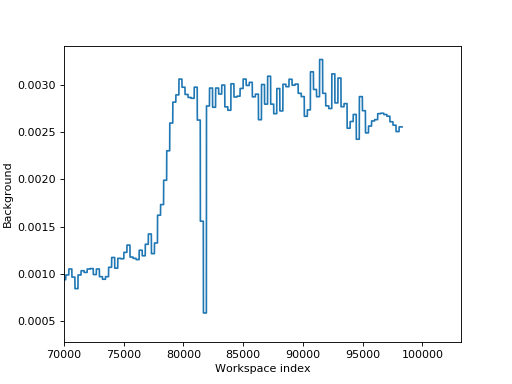\(\renewcommand\AA{\unicode{x212B}}\)
Table of Contents
| Name | Direction | Type | Default | Description |
|---|---|---|---|---|
| InputWorkspace | Input | MatrixWorkspace | Mandatory | A workspace to fit the backgrounds to. |
| OutputWorkspace | Output | MatrixWorkspace | Mandatory | The fitted backgrounds. |
| Components | Input | str list | A list of component names for which to calculate the backgrounds. | |
| EPPWorkspace | Input | TableWorkspace | Mandatory | A table workspace containing results from the FindEPP algorithm. |
| NonBkgRegionInSigmas | Input | number | 6 | Half width of the range excluded from background around the elastic peaks in multiplies of ‘Sigma’ in the EPP table.’. |
| Degree | Input | number | 0 | The degree of the background polynomial. |
| DiagnosticsWorkspace | Input | MatrixWorkspace | Detector diagnostics workspace for masking. |
This algorithm calculates the time-independent background over instrument components. It is geared towards TOF spectrometers with position sensitive detector tubes such as IN5 or PANTHER at the ILL and can be readily used as a part of ILL’s direct geometry reduction workflow (see here).
The algorithm works as following:
The OutputWorkspace contains the evaluated background polynomials and can be readily used for background subtraction.
The tube components can be given as a list of component names in Components, or listed as a comma separated string in the instrument parameters file under the name components-for-backgrounds.
The background exclusion range is determined by the EPPWorkspace and NonBkgRegionInSigmas properties. EPPWorkspace is a table workspace containing the centres of the exclusion regions, usually the elastic peaks of a TOF workspace. Such a workspace can be produced for instance by FindEPP or CreateEPP algorithms. The exclusion region is [PeakCentre - NonBkgRegionInSigmas * Sigma, PeakCentre + NonBkgRegionInSigmas * Sigma] where PeakCentre and Sigma are read from EPPWorkspace.
Any pixel for which the FitStatus column in EPPWorkspace is not equal to success is ignored.
A mask workspace produced for example by DirectILLDiagnostics can be given in the DiagnosticsWorkspace property to exclude pixels with known problems. Of course, InputWorkspace can be directly masked, too.
Note
To run these usage examples please first download the usage data, and add these to your path. In Mantid this is done using Manage User Directories.
Example - Usage as part of reduction workflow
from mantid.simpleapi import *
import matplotlib.pyplot as plt
import numpy as np
# Load and preprocess some IN5 data
DirectILLCollectData('ILL/IN5/104007.nxs',
OutputWorkspace='ws', OutputEPPWorkspace='epp')
# Get default hard mask + beam stop mask
DirectILLDiagnostics('ws', OutputWorkspace='diagnostics_mask')
DirectILLTubeBackground('ws', OutputWorkspace='bkg',
EPPWorkspace='epp', DiagnosticsWorkspace='diagnostics_mask')
bkg = mtd['bkg']
# Apply the background
ws_bkg_subtracted = Subtract('ws', bkg)
# Plot the background levels of tubes in the forward direction
bkg_y = bkg.extractY()
fig, ax = plt.subplots(subplot_kw={'projection':'mantid'})
xs = np.arange(0, bkg.getNumberHistograms())
ax.plot(xs, bkg_y[:, 0])
ax.set_xlim(xmin=70000)
ax.set_xlabel('Workspace index')
ax.set_ylabel('Background')
# Uncomment the following to show the plot
#fig.show()
# Remove all workspaces
mtd.clear()
(Source code, png, hires.png, pdf)

Categories: AlgorithmIndex | CorrectionFunctions\BackgroundCorrections | ILL\Direct
C++ header: DirectILLTubeBackground.h (last modified: 2021-03-31)
C++ source: DirectILLTubeBackground.cpp (last modified: 2021-03-31)